Complete Solutions to Physics of chapter KARNATAKA CET 2001 of Class 12 book with complete answers and questions
| Class 12 | PHYSICS |
| Chapter | KARNATAKA CET 2001 |
| KCET PREVIOUS YEAR PAPERS | Physics |
| Number Of Questions | 60 |
| Academic Year | 2023-24 |
A balloon starts rising from thee ground with an acceleration of `1.25 m//s^(2)`. After 8 s, a stone is released from the balloon. The stone will (taking `g = 10 ms^(-2)`)
View SolutionWhen a ceiling fan is switched off, its angular velocity reduces by 50% while it makes 36 rotations. How many more rotations will it make before coming to rest ? (Assume uniform angular retardation)
View SolutionThe resultant of two forces 3P and 2P is R. If the first force is doubled then the resultant is also doubled. The angle between the two forces is
View SolutionIf both the mass and radius of the earth decreases by 1% then the
View SolutionA vertical glass capillary tube, open at both ends, contains some water. Which of the following shapes may be taken by the water in the tube?
View SolutionA ball is thrown vertically upwards. Assuming the air resistance to be constant and considerable,
View SolutionDuring an adiabatic process, the pressure of a gas is found to be proportional to be the cubic of its absolute temperature. The ratio `C_(P)//C_(V)` gas is
View SolutionNewton postulated his corpuscular theory on the basis of
View SolutionThree rods of same dimensions are arranged as shown in the figure. They have thermal conductivities `K_(1)`, `K_(2)` and `K_(3)`. The points A and B are maintained at different temperatures. For the heat to flow at the same rate along ACB and AB,
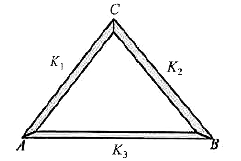
View SolutionTwo spherical black bodies of radii `r_(1)` and `r_(2)` and with surface temperatures `T_(1)` and `T_(2)` respectively, radiate the same power. Then `r_(1)//r_(2)` must be equal to
View SolutionA small object is placed 10 cm in front of a plane mirror. If you stand behind the object 30 cm from the mirror, and look at its image, for what distance must you focus your eyes?
View SolutionA luminous object is separated from a screen by a distance D. What is the greatest focal length a lens could have to focus the object on the screen?
View SolutionA ray of light is incident normally on one of the faces of a prism of angle `30^@` and refractive index `sqrt 2`. The angle of deviation of the ray is
View SolutionHow wil the image formed by a convex lens be affected, if the central portion of the lens is wrapped in black paper, as shown in the figure.

View SolutionAn ideal gas is taken ABCD as shown in the PV diagram. The work done during a cycle is
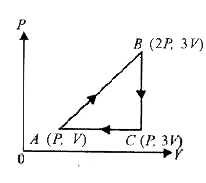
View SolutionThe wavelength of the light used in Young's double slit experiment is `lamda`. The intensity at a point on the screen where the path difference is `(lamda)/(6)` is `I`. `I_(0)` mdenotes the maximum intensity then the ration of `I` and `I_(0)` is
View SolutionA beam of light of two wavelengths `6500Å` and `5200Å`, is used to obtain interference fringes in Young's double slit experiment. Suppose the `m^(th)` brght fringe due to `6500Å` coincides with `n^(th)` bright fringe due to `5200Å` at a minimum distance from the cental maximum. Then
View SolutionIn the experiment of diffraction at a single slit, if the slit width is decreased, the wdith of the central maximum
View SolutionWhen light is incident on a doubly refracting crystal, two refracted rays-ordinary ray ( O -ray) and extra ordinary ray ( E -ray) are produced. Then
View SolutionA `20cm` length of a certain solution causes right-handed rotation of `38^@`. A `30cm` length of another solution causes left-handed rotation of `24^@`. The optical rotation caused by `30cm` length of a mixture of the above solutions in the volume ratio `1:2` is
View SolutionA sine wave has an amplitude A and wavelength `lambda`. Let V be the wave velocity and v be the maximum velocity of a particle in the medium. Then
View SolutionA wave is represented by the equation `y = a sin (kx - omega t)` is superposed with another wave to form a stationary wave such that the point x= 0 is a node. Then the equation of the other wave is
View SolutionA plane wave is described by the equation `y = 3 cos (x/7 - 10 t - pi/6)`.
The maximum velocity of the particles of the medium due to this wave is
View SolutionA bus is moving with a velocity of `5 ms^(-1)` towards a huge wall. The drive sounds a horn of frequency 165Hz. If the speed of sound in air is 335 m//s, the number of beats heard per second by a passenger on the bus will be
View SolutionThe speed of sound through a gaseous medium bears a constant ratio with the rms speed of its molecules. This constant ratio is
View SolutionA second harmonic has to be generated in a string of length l stretched between two rigid supports. The points where the string has to be plucked and touched are
View SolutionIn a sonometer wire, the tension is maintained by suspending a 50.7kg mass from the free end of the wire. The suspended mass has a volume of `0.0075m^(3)`. The fundamental frequency of the wire is 260Hz. If the suspended mass is completely submerged in water, the fundamental frequency will become (take `g= 10 ms^(-2)`)
View SolutionIf the velocity of sound in air is `336 ms^(-1)`, the maximum length of a closed pipe that would produce a just audible sound is
View SolutionTransverse waves of the same frequency are generated in two steel wires A and B. The diameter of A is twice of B and the tension in A is half that in B. The ratio of the velocities of waves in A and B is
View SolutionWhen we hear a sound, we can identify its source from
View SolutionA charge q is placed at the centre of the line joining two equal charges Q. The system of three charges will be in equilibrium if q is equal to
View SolutionTwo equal negative charges -q are fixed at the points `(0,alpha)` and `(0, -alpha)` on the y-axis. A positive charge Q is released from rest at the point `(2alpha, 0)` on the x-axis. The charge Q will
View SolutionA ball of mass 1g and charge `10^(-8) C` moves from a point A whose potential is 600V to the point B whose potential is zero. Velcoity of the ball at the point B is `20 cm s^(-1)`. The velocity of the ball at the point is
View SolutionIn a parallel plate capacitor of capacitance C, a metal sheet is inserted between the plates, parallel to them. The thickness of the sheet is half of the separation between the plates. The capacitance now becomes
View SolutionWhile a capacitor remains connected to a battery, a dielectric slab is slipped between the plates. Then
View SolutionAn electric bulb is designed to draw power `P_(0)` at voltage `V_(0)`. If the voltage is V, it draws a power P. Then
View SolutionThree resistances of values `2Omega, 3Omega and 6Omega` are to be connected to produce an effective resistance of `4Omega`. This can be done by connecting
View SolutionFive resistance are connected as shown in the figure. The equivalent resistance between A and C is
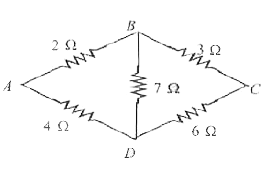
View SolutionA battery supplies 150W and 196 W power to two resistors of `6Omega and 4Omega` when they are connected separately to it. The internal resistance of battery is
View SolutionA battery of electromotive force E is connected in series with a resistance R and a voltmeter. An ammeter is connected in parallel with the battery. Then
View SolutionAn electron moving in a circular orbit of radius makes n rotations per second. The magnetic field produced at the centre has magnitude :
View Solution`ABCD` is a square loop made of a uniform conducting wire. A current enters the loop at `A` and leaves at `D`. The magnetic field is
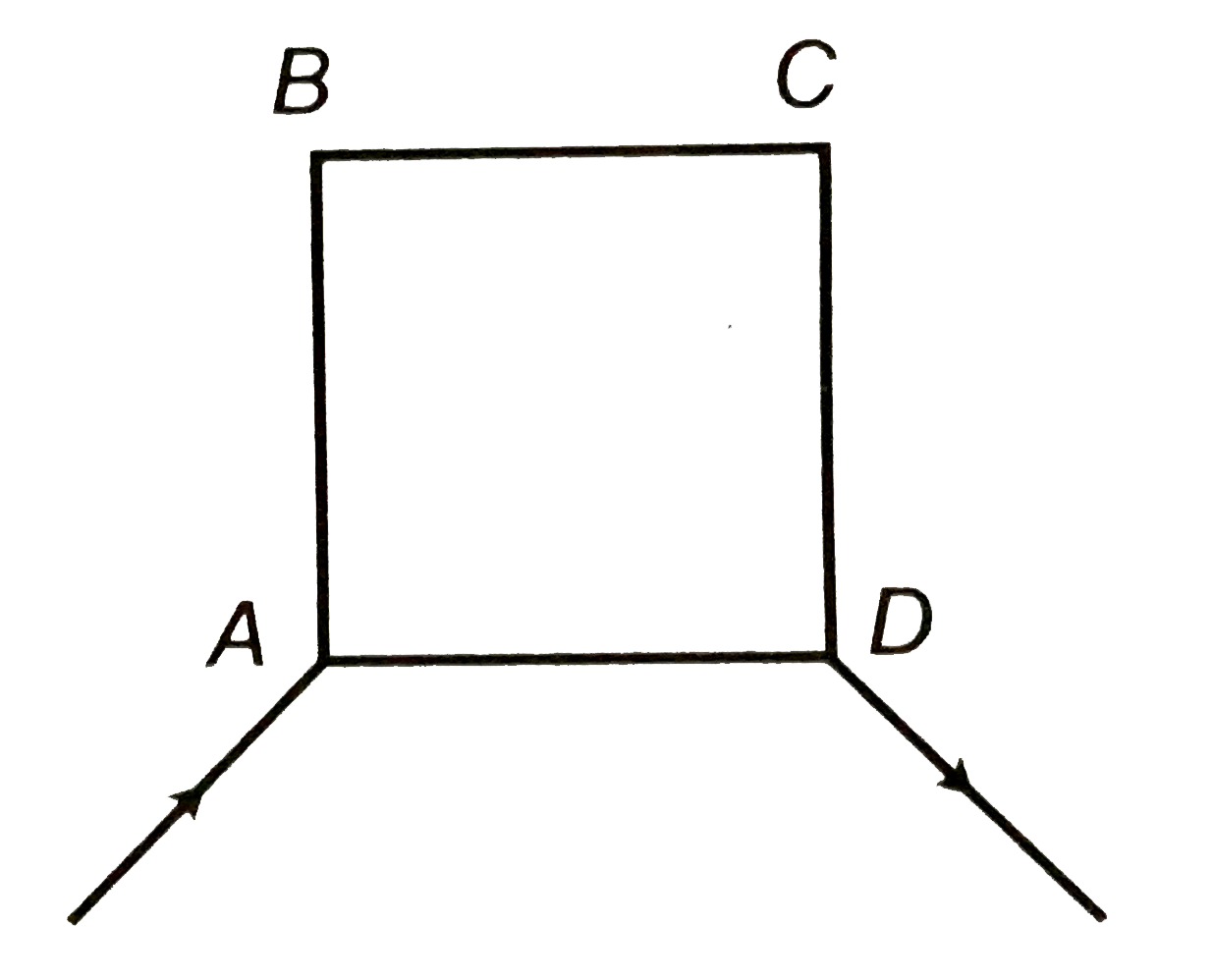
View SolutionA milliammeter of range 10 mA has a coil of resistance `1Omega`. To use it as a voltmeter of range 10V, the resistance that must be connected in series with it is
View SolutionMagnetic fields at two points on the axis of a circular coil at a distance of `0.05m` and `0.2 m` from the centre are in the ratio `8:1`. The radius of the coil is
View SolutionPick out the statement which is not true?
View SolutionThe relative permeability is represented by `mu_(r)` and susceptibility is denoted by `chi` for a magnetic substance then for a paramagnetic substance.
View SolutionA small magnet `M` is allowed to fall through a fixed horizontal conducting ring `R`. Let `g` be the acceleration due to gravity. The acceleration of `M` will be
View SolutionIn the circuit shown in the figure, neglecting source resistance, the voltmeter and ammeter readings will respectively be
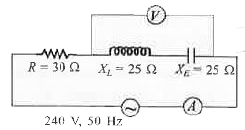
View SolutionA train is moving towards north with a speed of 180 kilometer per hour. If the vertical component of the earth's magnetic field is `0.2 xx 10^(-4)T`, the e.m.f induced in the axis 1.5m long is
View SolutionThe core of a transformer is laminated to reduce
View SolutionTwo nucleons are at a separation of `1 xx 10^-15 m`. The net force between them is `F_1`, if both are neutrons, `F_2` if both are protons and `F_3` if one is a proton and other is a neutron. In such a case.
View SolutionThe electron in a hydrogen atom makes a transition from `n=n_(1)` to `n=n_(2)` state. The time period of the electron in the initial state `(n_(1))` is eigh times that in the final state `(n_(2))`. The possible values of `n_(1)` and `n_(2)` are
View SolutionIf radiation of all wavelengths from ultraviolet to infrared ispassed through hydrogen gas at room temperature absorption lines will be observed in the
View SolutionLet the potential energy of hydrogen atom in the ground state be zero. Then its total energy in the first excited state will be
View SolutionThree fourthers of the active nuclei present in a redioactive sample decay in 3/4s. The half life of the sample is
View SolutionPick out the statement which is not true?
View SolutionThe work function of aluminium is 4.125eV. The cut off wavelength for photoelectric effect for aluminium is
View SolutionPick out the statement which is true
View SolutionIf the forward voltage in a diode in increased, the width of the depletion region.
View SolutionIn an n-p-n transistor circuit, the collector current is 10mA. If 90% of the electrons emitted reach the collector, the emitter current `(I_(E ))` and base current `(I_(B))` are given by
View Solution
Physics questions and complete solutions for chapter KARNATAKA CET 2001 of KCET PREVIOUS YEAR PAPERS of Class 12